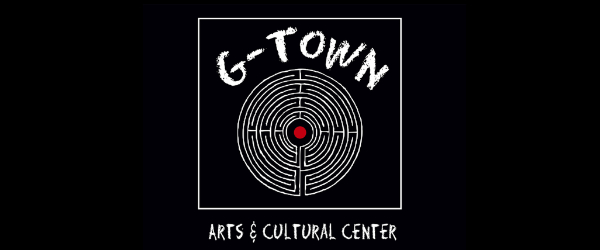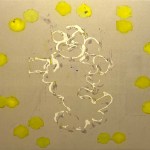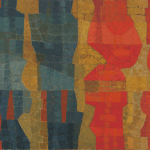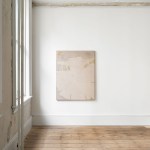
The principal of our junior high school was a felon. His name was Mr. Phillips. He was a short man – as short as we were – with a large head of thick hair and dark-rimmed glasses. We called him “Froggy” behind his back. The cops arrested him in a motel parking lot holding up a prostitute at gunpoint. The story made the front page of all the local papers. They said the gun wasn’t loaded, but he was. People talked about it for weeks, maybe longer. Everyone was astonished that Mr. Phillips had signed his real name in the motel register. For this they called him an idiot.
When I was twelve, we moved to a town about an hour and a half away. My parents threw a party and invited all their friends. They brought expensive bottles of booze, even though they knew my parents didn’t like hard liquor. I thought some of the cocktails were intriguing, like the one made with a green liquid that smelled like paregoric.

For the party, Mom made her usual stuffed grape leaves and baba ghanouj, deviled eggs with lots of mayonnaise, shrimp cocktail, and my favorite: pigs in a blanket. We had a stereo and lots of records, including calypso my dad brought back from Trinidad. He put on Harry Belafonte and Lord Melody – “Day-O!” and “Creature From the Black Lagoon.” By midnight, the guests were pretty drunk. Someone cranked up the volume and tied a rope between two chairs. I sat at the top of the stairs in my pajamas with my plate of pigs in a blanket and watched them try to dance the limbo.
My parents’ friends were young couples starting families like them. Everyone went to the same parties, swam at the beach, sailed small boats in the bay, and played tennis together. Most of them belonged to the local Unitarian church. Unitarianism was a self-described liberal religion committed to upholding a “free and responsible search for truth and meaning.” A Unitarian church was one of the few places where lapsed Catholics and non-conforming Jews could get married. My Jewish dad and Muslim mom fit right in. Mom was the only Egyptian anyone had ever met, not to mention the only Muslim, which she pronounced “Moslem.” Tickled by the Egyptian in their midst, people interrogated Mom about her childhood. Did she visit the Pyramids? Did she wear sheets and ride camels? Did she own shoes? I overheard her tell someone she grew up running barefoot through the sand without any clothes on. For a short while, there was one Black family in the congregation. I played with the daughter who was my age, but when her parents got divorced she left town with her mother.
The church offices were in an old wooden house. Services were held out back in a detached, low-slung garage made of cinderblocks. There was no minister, and members of the congregation delivered the Sunday sermons. They were more like lectures, and topics ranged from marine biology to bird watching to baking bread. Sometimes, people read their own poetry. Sunday service was followed by coffee and Danish. The coffee was brewed over the course of the morning in a giant stainless-steel percolator that gave off a chemical smell. For candlelight service on Christmas Eve, we sang three-part harmonies in the bone-cold cinderblock building. Molten wax seeped from our tinfoil candleholders onto our mittens and the pages of our hymnals that sat untouched in a corner for the rest of the year.

We put on pageants. When I was eight, I landed the part of the Ghost of Christmas Present in A Christmas Carol. I drifted around the house for weeks wrapped in a bed sheet, rehearsing my lines. “Touch my robe!” One summer, we staged an adaptation of Hair, and my rendition of “Frank Mills” earned me a spot in the choir. The following summer, we put on Joseph and the Amazing Technicolor Dreamcoat, which a number of parents felt was more appropriate than Hair. The year after that we did Jesus Christ Superstar, an obvious winner.
Aunt Safi always spent Christmas with us. She mailed our presents weeks in advance so she wouldn’t have to carry them on the train. The packages kept arriving. She always picked up something special for me on her travels – a blue glass bead from Cairo to ward away the evil eye, or a silver bracelet from Yemen. Before coming to our house, she’d spend a week with my Manhattan cousins. Every year it was the same: they pleaded with Safi to take a taxi from Penn Station, they’d even pay her cab fare. But Safi hated taxis, especially New York City cabs, and called the fares “highway robbery.” She insisted on walking. She dragged her blue Samsonite crosstown year after year, until she got too old to walk.

For Christmas, Safi visited our local beauty parlor to get a perm. She would come back a few hours later looking exactly the same. She packed an assortment of cashmere cardigans, one that was red and green for the party. She pinned a brooch over her heart, usually something with rhinestones in the shape of a wreath or a reindeer, sometimes a snowflake. She wore all her gold bangles at once, including the 24-carat ones from Saudi Arabia that she saved for special occasions. She would jangle them and tell me their back stories with a barely perceptible sigh.
Dad wore the same festive tie and vest every year, but Mom always had to buy a new outfit. She would take me to the mall to help her shop for it. I’d hop in the passenger side of her red Volkswagen beetle and wait until she got up the nerve to pull onto the highway. Her jaws worked her gum as she considered the road. We’d creep along until all of a sudden we were off! But I hated the mall. I hated the lurching escalators with their smell of scorched rubber. I hated the Muzak – Christmas carols alternating with “Wild Horses” and “Another Girl” – interrupted by coded messages that made it feel like we were shopping in a hospital.
Safi always brought an assortment of perfumes, including a bottle of something called Secret from Chabrawichi. She said it was famous. I could never manage to prise open the rubber stopper with my tiny fingers. She would dab a few drops on each wrist and under her chin. Mom, who normally loved perfume, couldn’t stand Safi’s scents.
Oof, Safi! Why do you have to wear so much perfume?
You know nothing about perfume, Safi would say.

We were always late. By the time we got to the party, the fireplace had been stoked many times and a cloud of smoke hung at shoulder height in the center of the room. People stood talking, sat with their drinks, or patted the dachshund hiding in its bed under the Christmas tree. It was a blue spruce, the most expensive tree around, adorned with antique ornaments and real tinsel instead of the increasingly popular plastic kind.
Our hosts had made an alcohol-free punch for the kids with real strawberries floating in it, and homemade eggnog spiked with bourbon for the grown-ups. An entire table was set aside for bottles of wine and liquor. Safi was partial to the eggnog. After a few glasses she began to soften, and I would sit and watch my aunt transform into someone I barely recognized.
Two long tables held platters of food: pink roast beef, a bronzed turkey, loaves of crusty bread, and soufflés that never fell flat. For dessert, there was all kinds of pie and a traditional Christmas pudding drenched in cognac. Our host would bring it out to the table with a flourish and set it on fire with a match.
The house had a winding staircase that led to the attic, where we disappeared to play games while the adults stayed downstairs. With the first light of morning, our parents would come and peel our sleeping bodies off the floor and carry us to their cars. Once we hit puberty, the games took a predictable turn, and, after one round of groping in the dark, I decided never to go upstairs again.
Every year, the same man brought a leg of smoked ham on the bone. It was a Smithfield ham, after the town in Virginia where hams are cured by some magical process. He would grunt with effort as he carried the ham through the throng of boisterous people and into the kitchen, where our host unwrapped it and placed it on a large platter. Together they’d carry the ham to the table where it lay in state, surrounded by lesser meats.
I liked the man who brought the ham. Uncle Billy. People referred to his accent as a drawl. I thought he and his wife made a smart-looking couple – he with his scruffy chin and brown felt hat, she with her little black dress and pearls. Uncle Billy always carved the ham himself in a ritual he performed with the utmost care, like a murderer loath to leave a bruise on a corpse. A small audience would gather to watch him shave off ultra-thin slices with a sharp knife. It should be thin like aerogram paper, he’d say as he guided the blade in a direction parallel to the bone. As soon as he put down the knife, people would descend on the mound of feathery violet flesh. They’d compliment Uncle Billy as if he’d smoked the ham himself, lifting salty shreds to their lips with their fingers.
One year Uncle Billy came to the party alone. How forlorn he looked without his wife sulking beside him in her little black dress.
Hi Uncle Billy.
He barely looked at me. He finished his bourbon and got up to pour another. I babbled to fill the awkward silence. When I asked if I could carve the ham, Uncle Billy perked up, a sparkle in his bloodshot eyes. He asked if I knew my way around a Smithfield ham. It’s not like other hams, he said.
My heart raced as Uncle Billy handed me the knife. I stared at the ham glistening before me on the table. People stopped talking and turned to watch. An adult voice cautioned me not to cut myself. With a show of care, I sunk the blade into the burnished rind. It cut like butter. I made a second incision and removed a chunk shaped like a slice of watermelon. People gasped. The knife was taken from me. As I was ushered from the room, I looked over my shoulder at my work: a perfect wedge of fat with a triangle of purple meat clinging to it.
Contributed by Joy Garnett, images by Hoda Garnett
About the author: Joy Garnett is an artist and writer whose work explores forgotten histories through archival materials. Her paintings have been shown at the FLAG Art Foundation, MoMA–PS1, the James Gallery/CUNY Graduate Center, White Columns (all NY), and the Milwaukee Art Museum. Her writings have appeared in the Evergreen Review (NY), Rusted Radishes (Beirut), Full Blede (Los Angeles), Ibraaz (Kamal Lazaar Foundation), Ping-Pong (Henry Miller Memorial Library, Big Sur), and The Artists’ and Writers’ Cookbook (powerHouse Books, Brooklyn). She lives in Los Angeles where she’s completing a family memoir of Egypt.
NOTE: For readers who would like to submit stories to our Summer Fiction series, please send Word docs to us at twocoatsofpaint@gmail.com with FICTION in the subject line.
Related posts:
Radical reorientation: Leaving New York
10 ideas and influences: Joy Garnett
Joy Garnett stops the passing glance

























This memoir is so evocative. A wonderful writer indeed. It brought me completely to a new place.
That was a great read; the story of a lost world, beautifully told.